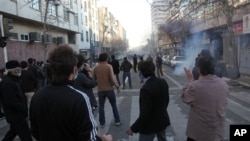Over the past two years, the Iranian regime has waged an increasingly virulent campaign against Iran's civil society. Hundreds of Iranian journalists, human rights defenders, religious minorities, and women's rights activists have been arrested, imprisoned, forbidden from engaging in their work, tortured and, in some cases, executed.
Now Iran's beleaguered civil society faces a new threat. The majlis is considering a bill that would set up a special committee, overseen by the Ministry of the Interior with representatives from security-based bodies, including the Basij, which would make key decisions for all civil society or non-governmental organizations. The committee would approve or disapprove registration permits, as well as requests for marches or demonstrations; have authority over boards of directors; and require prior permission for any cooperation with international agencies or participation in educational conferences abroad.
Amnesty International and the Amsterdam-based NGO Arseh Sevom say if the bill is passed (and its basic outlines have already been approved), "It will sound the death knell for civil society in Iran."
U.S. Secretary of State Hillary Clinton says that civil society holds governments accountable, keeps them honest, and helps them be more effective. She warns against governments which require private organizations to seek the state's approval and to serve the state's larger agendas. Such actions by governments crush civil society and the human spirit. And they are exactly contrary to the spirit of what Secretary Clinton calls "this historic moment":
"Across the Middle East today, we see people calling on governments to be more open, more accountable, more responsive. They want a stronger voice in their own affairs. They want to be treated fairly and with dignity."
The Iranian government likes to tout its elections and other trappings of democratic governance. But the way it deals with Iranian civil society demonstrates not a respect for the will of the Iranian people but a fear of their will.
In his Nowruz address this year, President Barack Obama noted that fear, but predicted that the future of Iran will not be shaped by it, but rather by the talent, the hopes and the choices of Iran's young people. "And," said President Obama, "though times may seem dark, I want you to know that I am with you."
Fear and Iran's Civil Society

Over the past two years, the Iranian regime has waged an increasingly virulent campaign against Iran's civil society.



